You should limit filter use in mobile photos to preserve authenticity and promote mental health. Excessive filtering distorts reality, creating unrealistic beauty standards that can harm self-esteem. It also stifles creativity and photographic skill development, leading to homogenized content. Overuse of filters can misrepresent cultural symbols and historical moments, raising ethical concerns in journalism and personal documentation. By embracing imperfections, you'll capture genuine moments and foster meaningful connections. Limiting filters allows your unique perspective to shine through, creating more impactful and memorable images. Explore how reducing filter use can enhance your photography and personal growth.
Authenticity in Digital Age
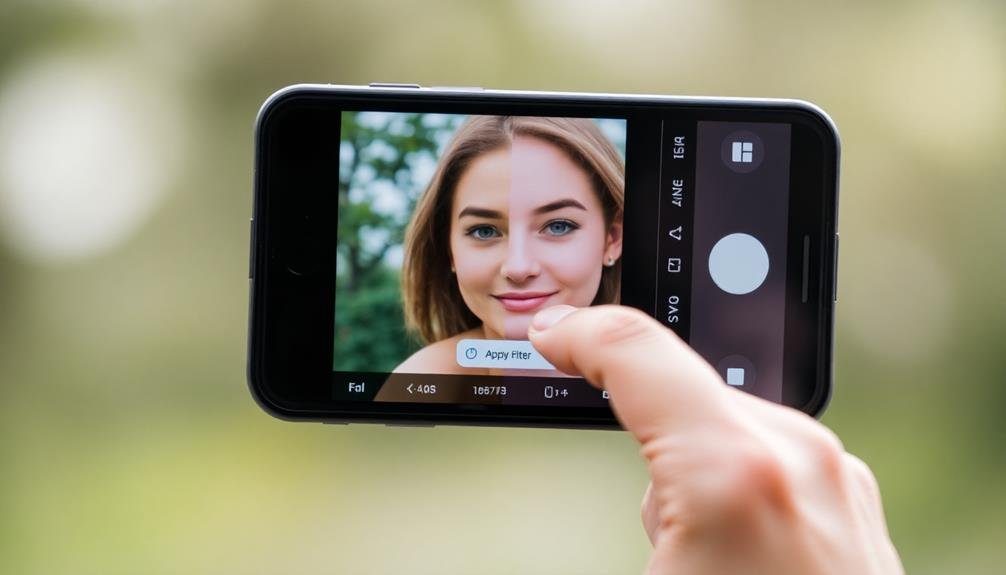
In an era dominated by digital imagery, authenticity has become a precious commodity. You're constantly bombarded with filtered, edited, and enhanced photos on social media platforms, making it difficult to distinguish reality from fabrication.
This overuse of filters and editing tools has created a distorted perception of beauty and life experiences. When you rely heavily on filters, you're contributing to a culture of unrealistic expectations. You're presenting an idealized version of yourself and your surroundings that often doesn't align with reality.
This can lead to feelings of inadequacy and low self-esteem in both yourself and others who view your content. By limiting filter use, you're embracing authenticity and promoting a more genuine representation of the world around you.
You're allowing your true self to shine through, imperfections and all. This approach fosters a healthier digital environment where people can connect on a more meaningful level.
Distortion of Reality
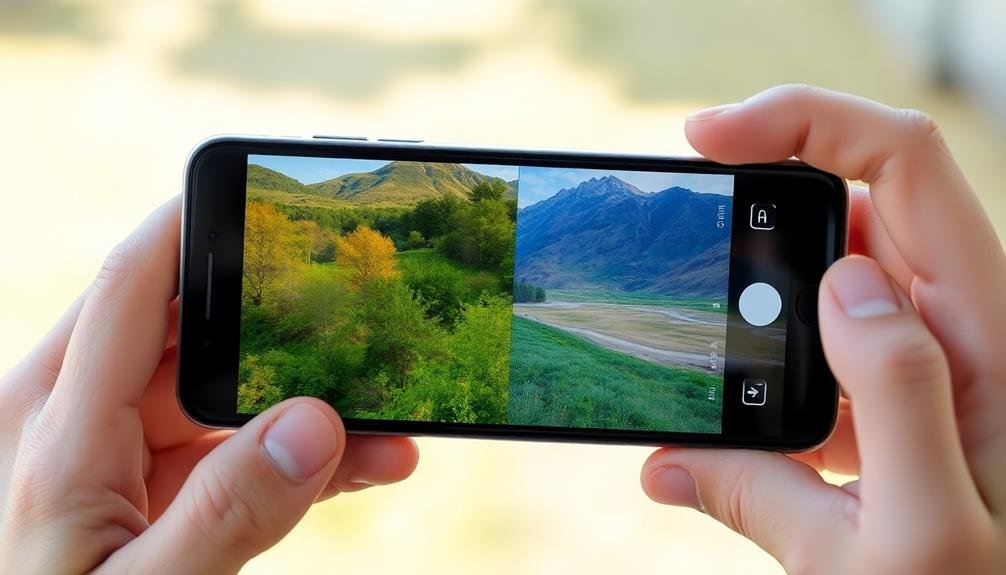
When you overuse filters in your mobile photos, you're contributing to unrealistic beauty standards that can harm both yourself and others.
You might find your perception of self gradually shifting as you become accustomed to seeing an altered version of your appearance.
Furthermore, by presenting a heavily filtered image on social media, you're creating a misleading online presence that doesn't reflect your true self.
Unrealistic Beauty Standards
How often do you scroll through social media, only to be bombarded by flawless faces and impossibly perfect bodies?
These images, often heavily filtered and edited, contribute to unrealistic beauty standards that can harm your self-esteem and body image.
When you constantly see altered photos, you're exposed to an unattainable level of perfection.
This can lead to feelings of inadequacy and a distorted perception of what's normal or beautiful.
You might find yourself comparing your unfiltered appearance to these artificial representations, which can trigger anxiety, depression, and even body dysmorphia.
The overuse of filters also reinforces narrow beauty ideals, promoting a homogenized look that often favors certain features or skin tones.
This can be particularly damaging for younger users who are still developing their self-image and identity.
Altered Perception of Self
As you increasingly rely on filters and editing tools for your photos, you're at risk of developing an altered perception of yourself. These digital enhancements can create a significant disconnect between your online image and real-life appearance, leading to a distorted self-image.
You might find yourself comparing your unfiltered reflection to the polished version you've grown accustomed to seeing on social media platforms. This altered perception can have serious psychological consequences.
You may experience increased anxiety, lower self-esteem, and a constant need for validation through likes and comments. The more you use filters, the more you might feel uncomfortable with your natural appearance, potentially leading to body dysmorphia or other mental health issues.
Moreover, this distorted self-image can affect your relationships and social interactions. You might become hesitant to meet people in person, fearing that you won't live up to the expectations set by your filtered photos.
This can lead to social isolation and difficulties in forming genuine connections. By limiting filter use, you can maintain a more realistic self-perception and foster healthier relationships both online and offline.
Misleading Social Media Presence
The altered perception of self often extends beyond personal experience, creating a ripple effect across social media platforms. When you consistently use filters on your photos, you're not just changing your own image; you're contributing to a distorted online reality. Your followers see a curated, enhanced version of your life that doesn't reflect the truth.
This misleading presence can have far-reaching consequences. You're setting unrealistic standards for yourself and others, fostering a culture of comparison and inadequacy. People may struggle to reconcile the polished online personas they encounter with their own unfiltered realities. This disconnect can lead to feelings of insecurity, anxiety, and depression among your followers.
Moreover, you're potentially damaging your real-life relationships. Friends and family might feel they don't truly know you, as your online presence doesn't match your in-person self. This discrepancy can create trust issues and hinder genuine connections.
Unrealistic Beauty Standards
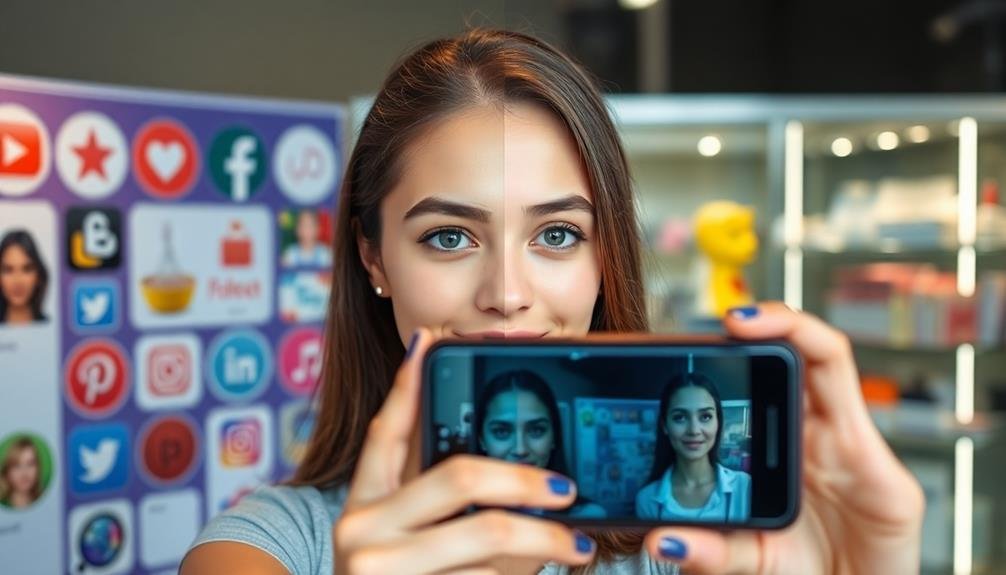
With excessive filter use, social media platforms have become breeding grounds for unrealistic beauty standards.
You're constantly bombarded with images of seemingly flawless individuals, their skin smoothed to perfection and features enhanced beyond recognition. These altered photos create a distorted perception of beauty that's impossible to achieve in real life.
As you scroll through your feed, you might find yourself comparing your natural appearance to these digitally manipulated images. This can lead to decreased self-esteem and body image issues.
You may feel pressure to conform to these unrealistic standards, spending excessive time and money on beauty products or even considering cosmetic procedures.
The problem is particularly acute for younger users who are still developing their sense of self-worth.
They're more susceptible to internalizing these unattainable ideals, potentially leading to long-term mental health issues.
Loss of Photographic Skills
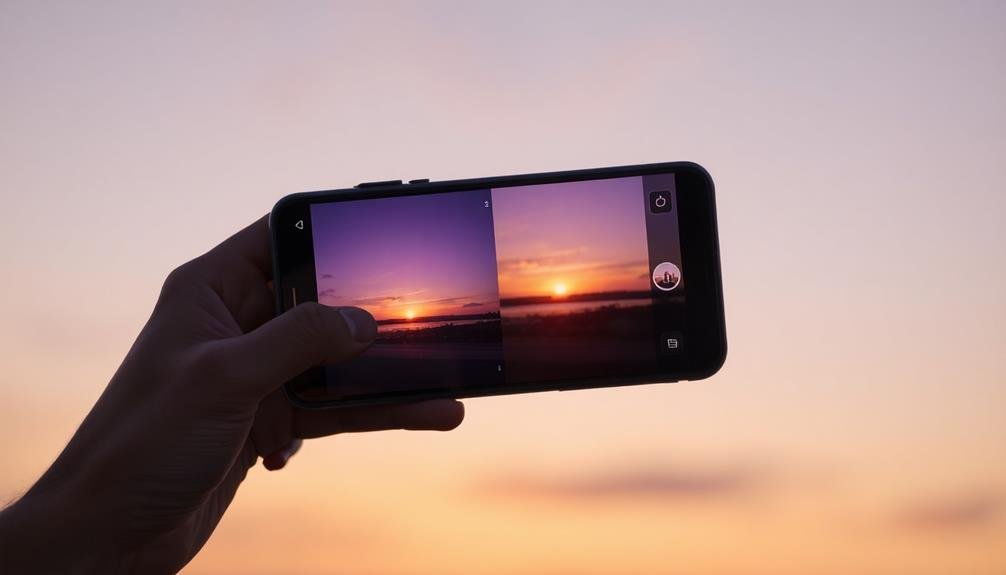
You're missing out on essential technical growth when you rely heavily on filters.
Your creativity can be stifled as you become accustomed to preset looks rather than developing your own style.
Overusing filters may lead to an inability to capture compelling images without them, hindering your overall photographic skills.
Stunted Technical Growth
Countless aspiring photographers are missing out on developing essential technical skills due to an overreliance on filters in mobile photography. When you constantly use pre-made filters, you're not learning how to manually adjust important elements like exposure, contrast, and color balance. These fundamental skills are necessary for creating high-quality images and understanding the intricacies of light and composition.
By relying on filters, you're stunting your growth in areas like post-processing techniques, color theory, and advanced editing software. You're not challenging yourself to experiment with different lighting conditions or pushing your creative boundaries. Instead, you're settling for a quick fix that often results in cookie-cutter images lacking originality.
Moreover, you're missing out on developing an eye for natural beauty and authenticity in photography. Filters can create unrealistic expectations and a distorted view of what makes a good photograph.
Reduced Creativity
By depending on filters, you're missing out on the opportunity to truly understand how different elements of photography work together.
You're not learning to manipulate light, shadow, and color to create the mood and atmosphere you want. This lack of hands-on experience prevents you from developing your own artistic vision and voice.
Moreover, filters can make your photos look generic and indistinguishable from countless others.
You're not challenging yourself to capture moments in innovative ways or to tell compelling visual stories. Instead, you're settling for a quick fix that may look appealing at first glance but lacks depth and originality.
To truly grow as a photographer, you need to step away from the comfort of filters and embrace the creative process of crafting images from scratch.
Overreliance on Presets
Filters and presets can lead to a dangerous overreliance that erodes fundamental photographic skills. When you consistently rely on pre-made adjustments, you're missing out on developing essential abilities that make you a better photographer.
You'll find yourself struggling to capture quality images without these digital crutches, limiting your growth and potential.
By overusing filters and presets, you're:
- Neglecting to learn proper composition techniques
- Failing to understand how light affects your images
- Missing opportunities to develop your unique style
- Losing the ability to manually adjust camera settings
You might think you're saving time by applying quick fixes, but you're actually stunting your progress as a photographer.
Instead of relying on presets, challenge yourself to create images that require minimal post-processing. Focus on getting the shot right in-camera by adjusting exposure, white balance, and composition before pressing the shutter.
This approach will force you to think critically about each element of your photo, helping you develop a deeper understanding of photography principles.
As you hone these skills, you'll be able to create more authentic and visually appealing images without relying on generic filters.
Overshadowing Natural Beauty
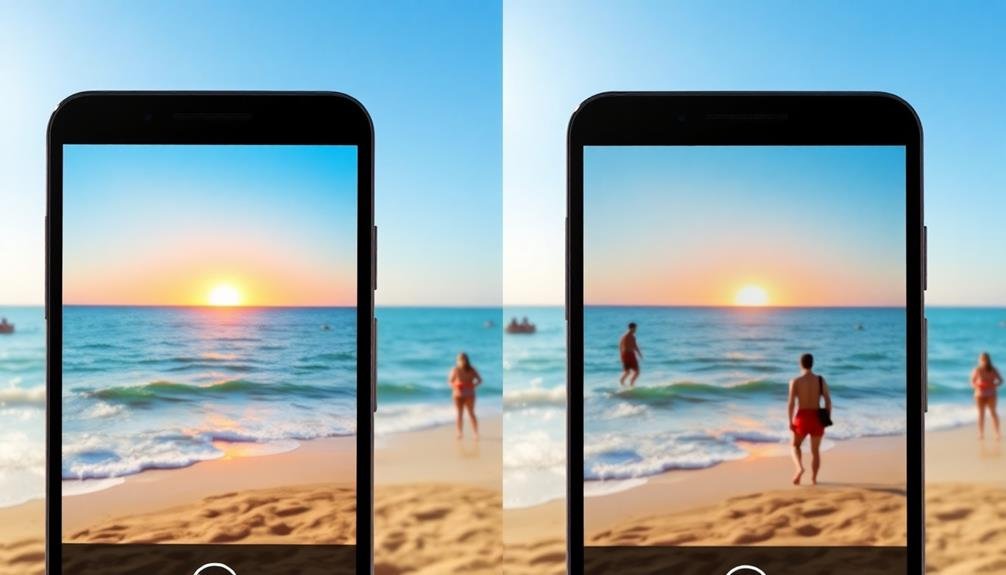
In spite of their popularity, excessive filter use on mobile photos can overshadow natural beauty. When you rely too heavily on filters, you're masking the authentic charm of your surroundings. Nature's intricate details and subtle hues often get lost beneath layers of artificial enhancements.
Consider the following comparison:
| Natural Beauty | Overly Filtered |
|---|---|
| Subtle colors | Oversaturated |
| Genuine textures | Smoothed out |
| Realistic lighting | Artificial glow |
| True-to-life skin | Poreless finish |
| Authentic mood | Exaggerated atmosphere |
Homogenization of Visual Content
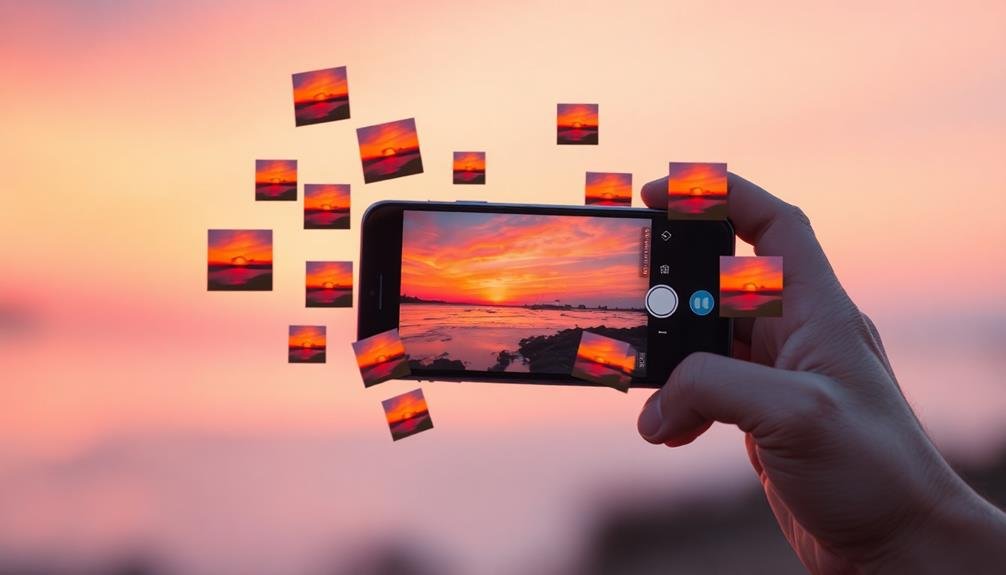
Another consequence of excessive filter use is the homogenization of visual content. When you rely too heavily on filters, you're contributing to a visual landscape where everything looks similar. This sameness can make it difficult for your photos to stand out and can diminish the unique qualities of the subjects you're capturing.
Consider these effects of filter overuse:
- Visual fatigue: Your audience may become bored seeing the same aesthetics repeatedly.
- Loss of authenticity: Your photos might lose their genuine feel, appearing artificial or contrived.
- Reduced artistic expression: Overreliance on filters can limit your creativity and personal style.
- Decreased impact: When everything looks alike, truly exceptional moments may lose their power.
You'll find that by limiting filter use, you're preserving the diversity of visual content. This approach allows you to maintain the integrity of your subjects and scenes.
It also encourages you to develop your photographic skills, relying on composition, lighting, and timing rather than post-processing effects. By embracing the natural variations in your photos, you're contributing to a richer, more diverse visual culture that celebrates uniqueness and authenticity.
Misrepresentation in Social Media
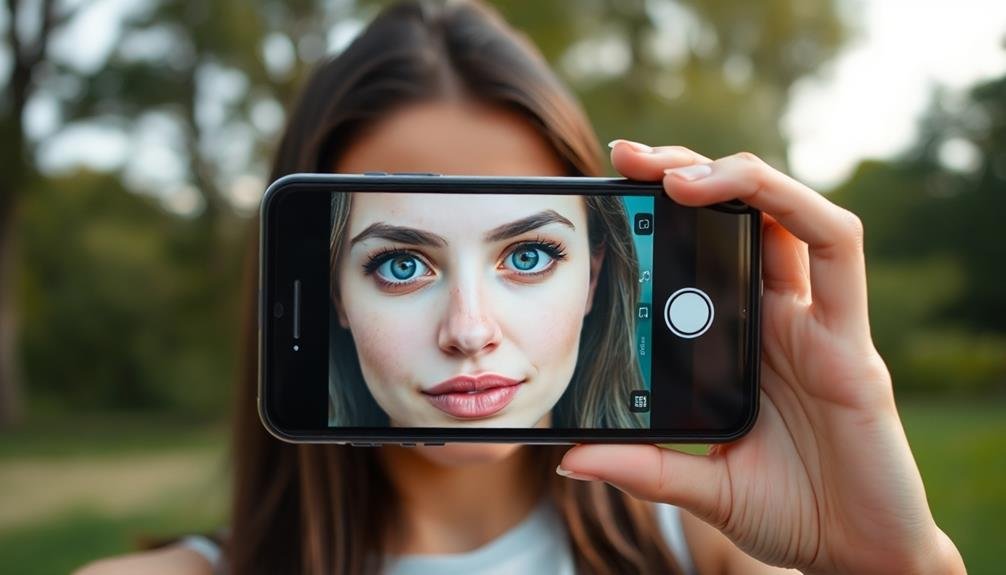
You've likely encountered countless filtered photos on social media that promote unrealistic beauty standards.
These heavily edited images can create a disconnect between authenticity and the pursuit of perfection.
Unrealistic Beauty Standards
Social media's obsession with perfection has created a digital landscape where unrealistic beauty standards thrive.
When you constantly view filtered and edited images, you're exposed to an idealized version of reality that's often unattainable. This can lead to feelings of inadequacy and low self-esteem, as you compare yourself to these unrealistic standards.
Excessive filter use contributes to these unrealistic beauty standards in several ways:
- It creates a false perception of flawless skin, erasing natural textures and imperfections.
- It alters facial features, promoting unrealistic proportions and symmetry.
- It enhances body shapes, often promoting unhealthy or impossible physiques.
- It perpetuates a narrow definition of beauty, excluding diverse representations.
Authenticity vs. Perfection
Aiming for authenticity in an increasingly filtered world presents a significant challenge for social media users. You're constantly bombarded with perfected images that can make you feel inadequate or pressured to present an idealized version of yourself.
This struggle between authenticity and perfection often leads to misrepresentation on social media platforms. When you rely heavily on filters, you're creating a distorted reality that doesn't reflect your true self. This can lead to a disconnect between your online persona and real-life experiences.
You might find yourself struggling to maintain this perfect image, causing stress and anxiety. On the other hand, embracing authenticity allows you to foster genuine connections with others. By sharing unfiltered moments, you're more likely to relate to others and receive authentic engagement.
It's important to remember that imperfections make you human and relatable. Consider the long-term impact of constantly presenting a filtered version of yourself. It can affect your self-esteem and create unrealistic expectations.
Impact on Mental Health
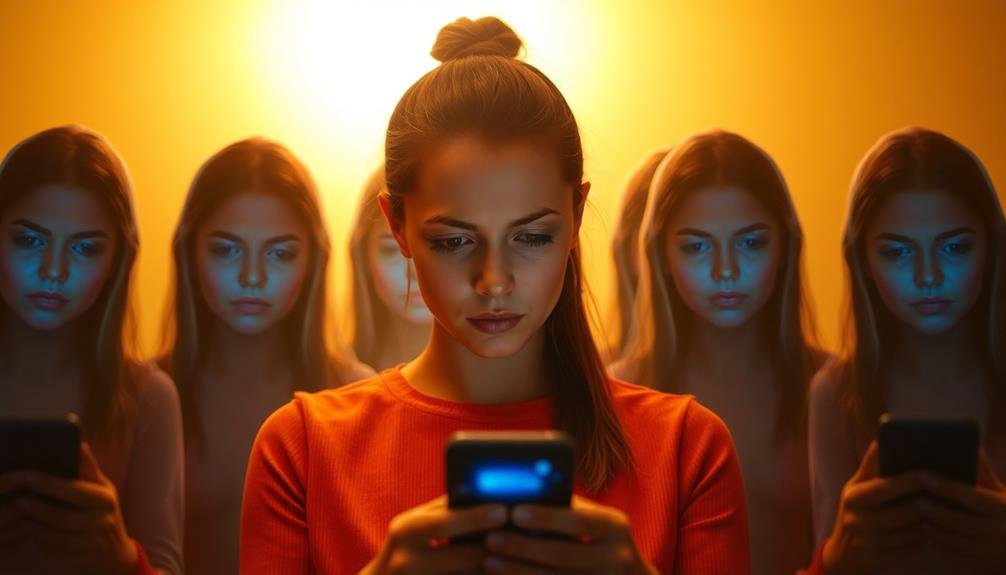
The excessive use of filters in mobile photos can take a toll on mental health. When you're constantly exposed to enhanced, "perfect" images, you're more likely to develop unrealistic expectations for yourself and others.
This disconnect between filtered reality and actual appearance can lead to decreased self-esteem and increased anxiety.
You might find yourself:
- Comparing your unfiltered appearance to others' filtered photos
- Feeling inadequate or unattractive without filters
- Spending excessive time trying to capture the "perfect" shot
- Becoming overly critical of your natural features
These behaviors can contribute to body dysmorphia, social anxiety, and even depression.
You may start avoiding social situations or feeling uncomfortable in your own skin. The constant pursuit of an idealized, filtered version of yourself can be exhausting and detrimental to your mental well-being.
Cultural Appropriation Concerns
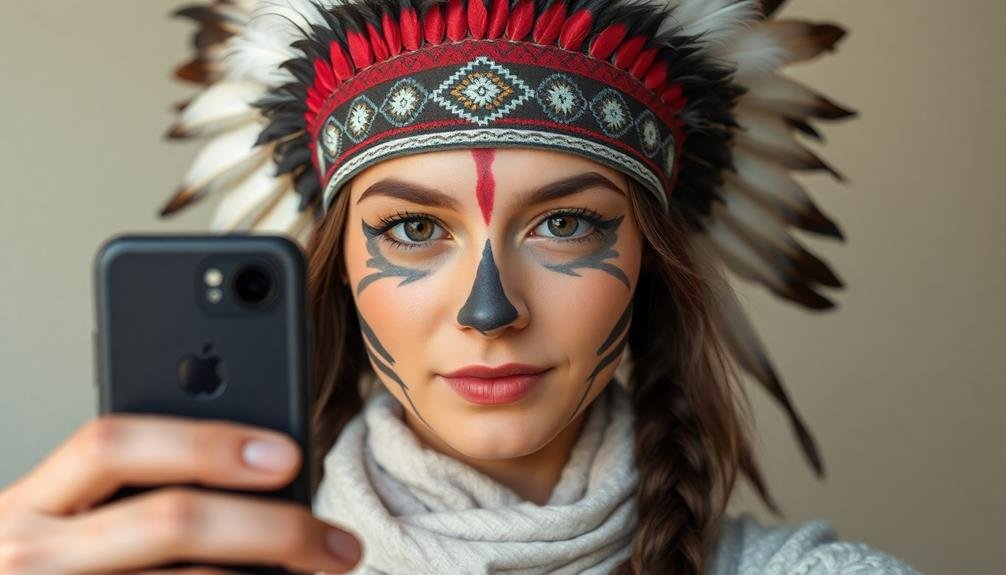
When you use photo filters that alter racial features, you're potentially engaging in a form of digital cultural appropriation.
You might unknowingly misrepresent traditional attire or cultural symbols through filters that add or modify clothing and accessories.
Racial Feature Alterations
Recently, social media platforms have come under fire for filters that alter racial features, sparking debates about cultural appropriation.
These filters often allow users to change their skin tone, eye shape, or facial structure, blurring the lines between appreciation and appropriation.
When you use these filters, you're not just changing your appearance; you're potentially perpetuating harmful stereotypes and minimizing the experiences of minority groups.
Consider the following impacts of using racial feature-altering filters:
- Reinforcing beauty standards: These filters often promote Eurocentric ideals, devaluing diverse features.
- Trivializing identity: Changing racial features with a tap trivializes the lived experiences of people of color.
- Cultural erasure: Altering ethnic features can contribute to the erasure of cultural identity.
- Promoting insensitivity: Using these filters may desensitize users to the importance of racial identity.
Traditional Attire Misrepresentation
Racial feature alterations aren't the only filters raising eyebrows in the digital world. Traditional attire filters have also come under scrutiny for their potential to misrepresent and appropriate cultural heritage. You might've noticed these filters that add traditional clothing or accessories from various cultures to your photos with just a tap.
While they may seem harmless or even celebratory, these filters often oversimplify complex cultural elements. They can reduce rich traditions to mere costumes, ignoring the deep significance behind traditional attire.
You're fundamentally wearing a digital version of someone else's cultural identity without understanding its importance.
Moreover, these filters frequently perpetuate stereotypes and inaccuracies. They may combine elements from different cultures or present outdated versions of traditional dress. This misrepresentation can be harmful, especially when it comes from users outside the culture being depicted.
Cultural Symbolism Trivialization
Filters that toss around sacred cultural symbols as mere decorations have come under fire for trivializing deeply meaningful traditions.
You'll often see these filters adding Native American headdresses, Japanese geisha makeup, or Hindu bindis to selfies without any regard for their cultural significance. This casual use of important symbols can be hurtful and disrespectful to the communities they belong to.
When you're using filters, consider the following points to avoid cultural appropriation:
- Research the symbols: Understand their meaning and importance before using them.
- Ask yourself: Would members of that culture find this offensive?
- Consider the context: Is it appropriate for you to use these symbols?
- Look for alternatives: Find filters that don't rely on cultural symbolism.
Diminishing Artistic Expression
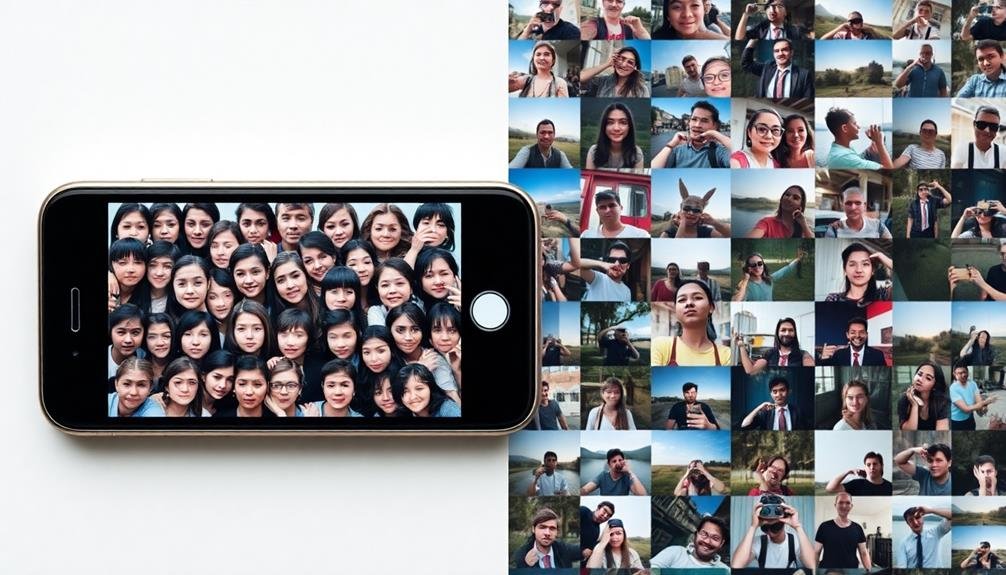
Many photographers and artists argue that limiting filter use in mobile photos could stifle creative expression. You might find that filters allow you to explore different visual styles and moods, enhancing your ability to convey emotions through your images.
They're often seen as digital tools that extend your artistic palette, much like different brush types or paint colors in traditional art.
However, overreliance on filters can lead to a homogenization of aesthetic, where countless photos look eerily similar. You'll notice that popular filters create a uniform look across social media platforms, potentially drowning out truly unique artistic visions.
This standardization may discourage you from developing your own style or experimenting with manual editing techniques.
Moreover, excessive filter use might hinder your growth as a photographer. You're less likely to learn about composition, lighting, and color theory if you're always relying on pre-made filters.
Preservation of Historical Accuracy

The preservation of historical accuracy in photography is a crucial consideration when discussing filter limitations. When you apply heavy filters to your photos, you're altering the original image, potentially distorting the true representation of a moment in time. This becomes particularly problematic when documenting significant events or capturing historical landmarks.
Consider these reasons why limiting filter use can help preserve historical accuracy:
- Authentic representation: Unfiltered photos provide a more accurate depiction of reality, allowing future generations to see events and places as they truly were.
- Credibility in journalism: Excessive filtering can compromise the integrity of photojournalism, leading to misinformation and distrust in media.
- Archival value: Unaltered images are more valuable for historical archives and research purposes.
- Cultural preservation: Filters can mask or change cultural elements in photos, potentially erasing important details about traditions, customs, and ways of life.
Ethical Considerations in Journalism
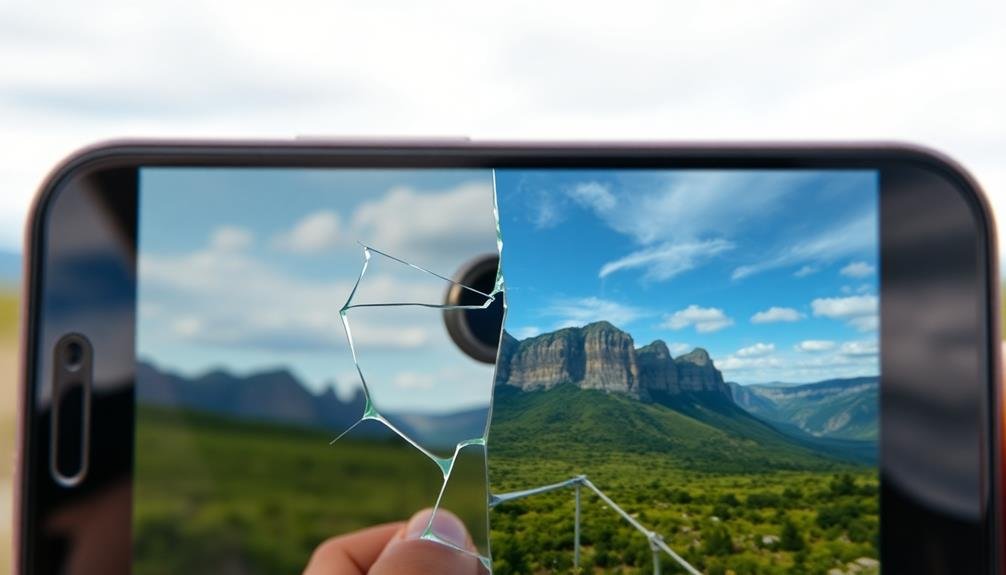
Ethical considerations in journalism extend beyond preserving historical accuracy to encompass a broader range of responsibilities. As a journalist, you're tasked with presenting truthful, unbiased information to the public. When you use filters on mobile photos, you risk compromising this integrity.
Consider these ethical implications:
| Ethical Concern | Potential Consequence |
|---|---|
| Misrepresentation | Distorting reality |
| Manipulation | Influencing public opinion |
| Credibility loss | Eroding trust in media |
| Sensationalism | Prioritizing engagement over truth |
You must weigh the desire for aesthetically pleasing images against your duty to report accurately. While filters can enhance visual appeal, they can also alter the essence of a scene, potentially misleading your audience.
Remember, your role is to inform, not to create art. By limiting filter use, you're upholding journalistic standards and maintaining transparency with your readers. This doesn't mean you can't improve image quality, but any adjustments should be minimal and aimed at clarity rather than dramatic effect.
Ultimately, your commitment to ethical journalism should guide your decisions about photo editing. It's about striking a balance between engaging visuals and honest reporting.
Overreliance on Technology
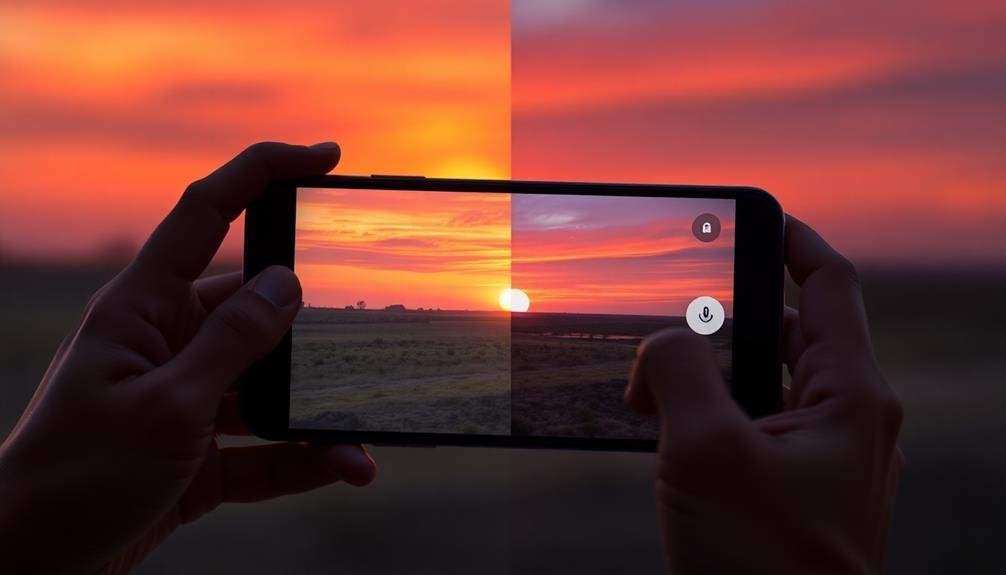
How often do you rely on filters to enhance your mobile photos? You're not alone if you find yourself habitually reaching for that perfect filter before sharing your snapshots.
However, this overreliance on technology can have unintended consequences.
When you depend too heavily on filters, you risk:
- Losing authenticity in your images
- Developing unrealistic expectations for real-life appearances
- Diminishing your natural photography skills
- Contributing to a culture of visual deception
By constantly applying filters, you're fundamentally outsourcing your creative vision to pre-programmed algorithms.
This can stifle your ability to capture genuine moments and develop a unique photographic style.
Furthermore, you might find yourself struggling to appreciate unfiltered beauty, both in photos and in real life.
Genuine Moments vs. Perfection
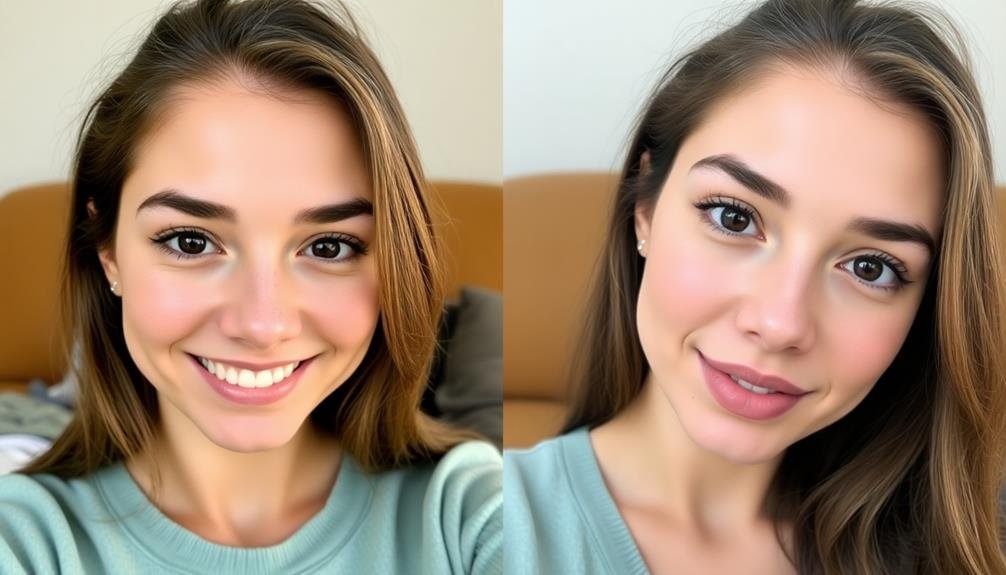
Why do we feel compelled to present a perfectly polished version of our lives through filtered photos? It's as if we're afraid to show the world our true selves, flaws and all.
But in this pursuit of perfection, we're losing the authenticity that makes life beautiful.
When you rely on filters, you're not capturing genuine moments; you're creating an idealized version of reality. This can lead to unrealistic expectations and a disconnect between your online persona and your actual life.
You might find yourself chasing an unattainable standard, constantly comparing your unfiltered experiences to others' carefully curated images.
Instead of focusing on perfection, try embracing the imperfections that make each moment unique.
Candid shots often tell a more compelling story than posed, filtered images. They capture real emotions, genuine laughter, and unexpected beauty.
Frequently Asked Questions
Are There Any Legal Restrictions on Using Filters in Professional Photography?
You'll find few legal restrictions on using filters in professional photography. However, you should be mindful of copyright issues when using preset filters and disclose any significant alterations when submitting images for journalistic or documentary purposes.
How Do Filters Affect Smartphone Battery Life and Storage Space?
You'll notice filters can drain your battery faster as they require more processing power. They'll also take up more storage space on your smartphone, especially if you're saving both original and filtered versions of your photos.
Can Excessive Filter Use Damage Phone Cameras Over Time?
No, excessive filter use won't damage your phone's camera. Filters are software-based and don't affect the physical camera components. However, overusing filters might drain your battery faster and take up more storage space on your device.
Are There Cultural Differences in Filter Preferences Across Various Countries?
You'll find cultural differences in filter preferences across countries. In some places, you might see a preference for subtle enhancements, while others embrace bold, dramatic filters. It's often influenced by local aesthetics and social media trends.
Do Photo Filters Impact the Effectiveness of Facial Recognition Technology?
Yes, photo filters can greatly impact facial recognition technology. They can alter key facial features, making it harder for algorithms to accurately identify individuals. You'll find that heavy filters often reduce the reliability of facial recognition systems.
In Summary
You've seen how excessive filter use can distort reality and promote unrealistic standards. It's time to reclaim authenticity in your photos. By limiting filters, you'll preserve genuine moments, hone your photography skills, and appreciate natural beauty. You'll contribute to historical accuracy and uphold journalistic ethics. Don't let technology overshadow your experiences. Embrace imperfections and capture life as it truly is. Your unfiltered photos will tell more honest, compelling stories.


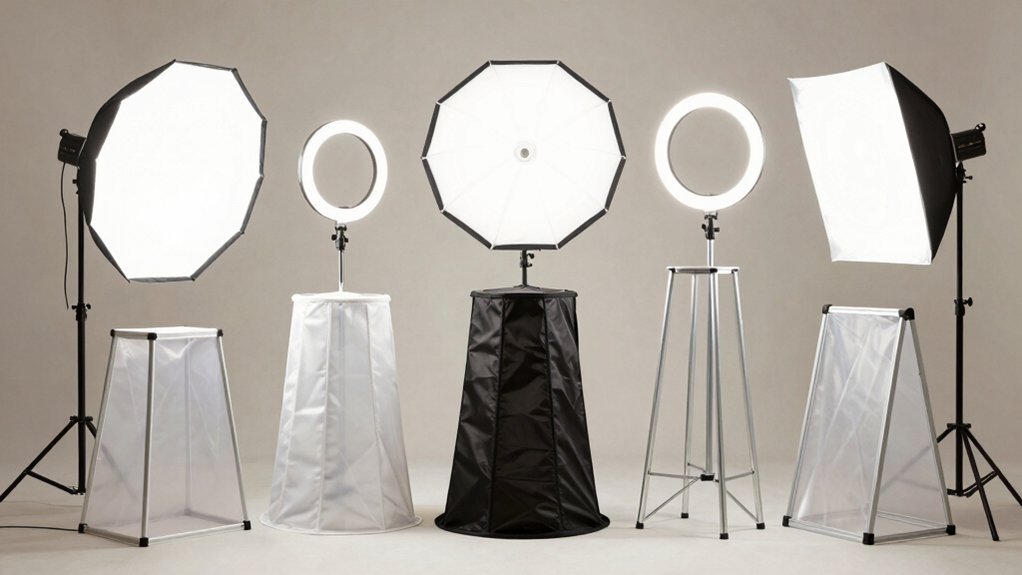
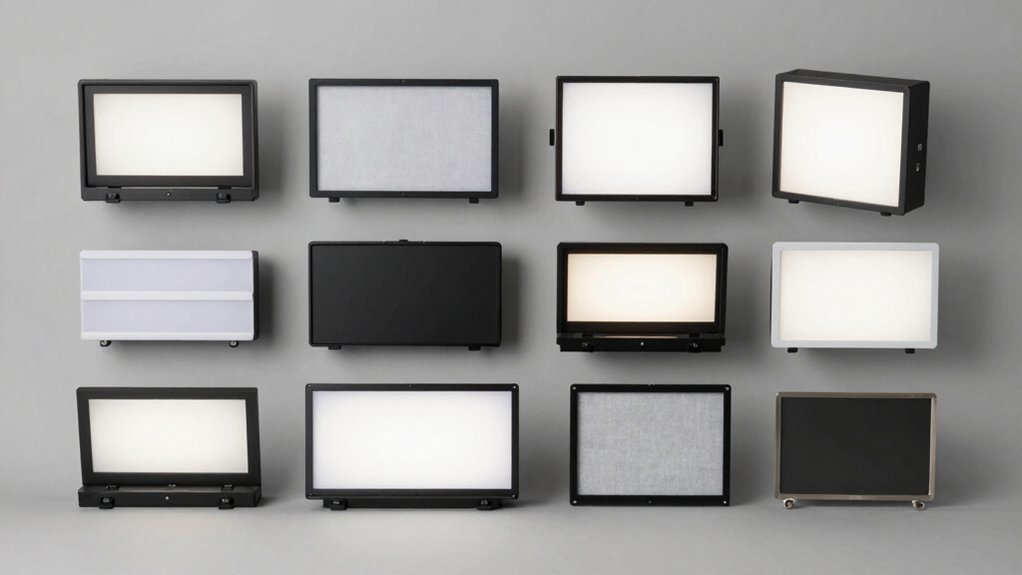
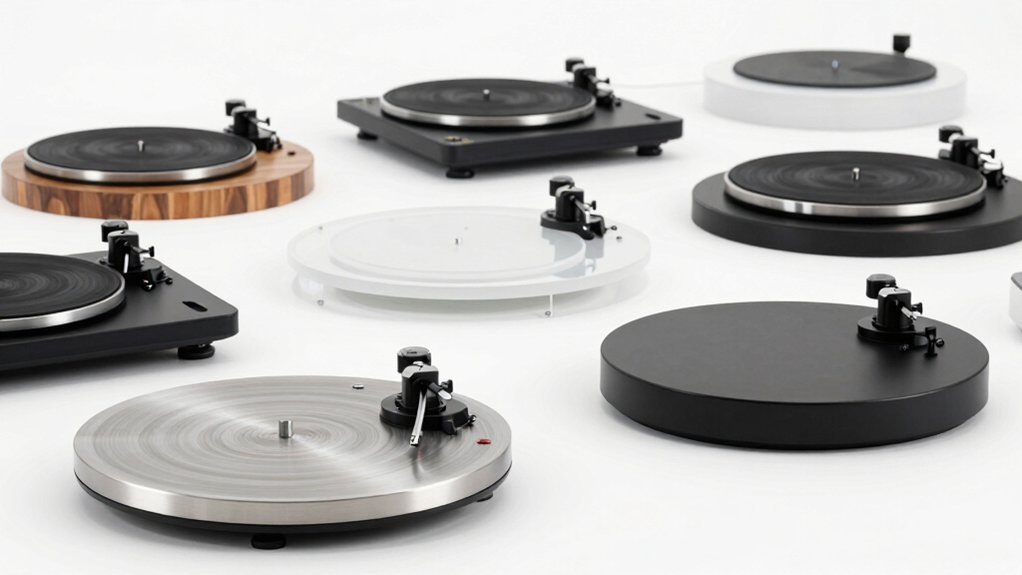
Leave a Reply